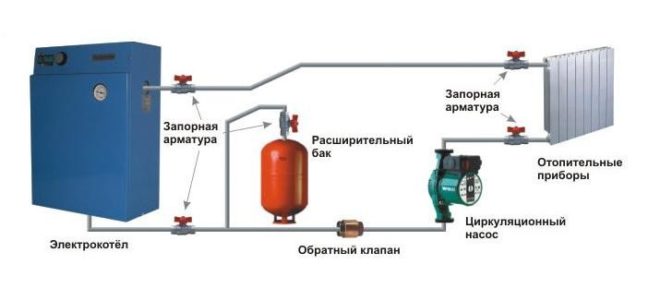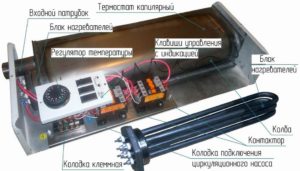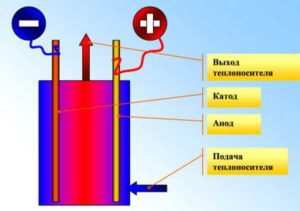Electric boiler for home heating - what can you save on?
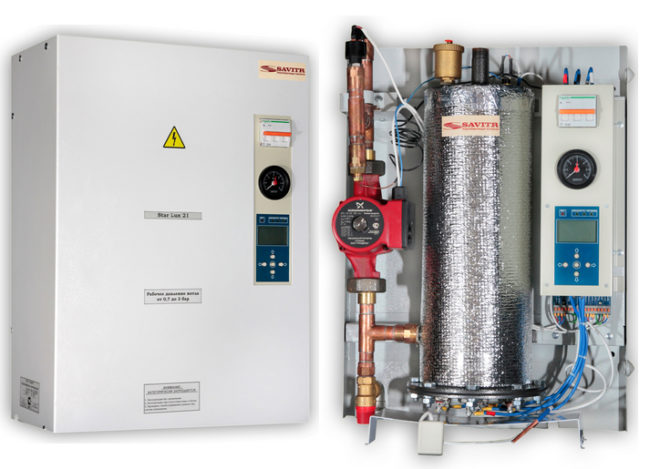
Preparing for cold weather is not limited to buying warm clothes and shoes. The priority task for every homeowner is to ensure the quality of the heating system. The constant rise in the price of electricity and utilities forces us to look for new options for saving. Energy-saving electric boilers are a reasonable solution to this issue. Such an acquisition will provide the proper temperature regime without ruining the family budget. Features of choice, types, as well as the basic rules for a successful purchase are discussed in the information of our article.
Content
The principle of operation of heating boilers
Such equipment works by simply converting electrical energy into heat. Then the heat carrier is heated and the rooms are heated directly. Of course, in this case, certain heat losses occur, so the promises of many manufacturers of 400% efficiency can at best be regarded as a fantasy, and at worst - deliberately deceiving the consumer.
At the same time, economical electric boilers do exist, and their choice is wide enough. They do not require constant supervision as solid fuel, and do not depend on gas supplies. Among the advantages are also reasonable energy consumption, small size and ease of connection. There is no need for him to equip a separate room, and the stylish design of modern models will easily fit into any interior.
The basic complete set of heating equipment includes:
- expansion tank, in which the coolant is heated;
- a heating element that performs the main function;
- heating control and regulation system, as well as other functions available in certain models.
Ordinary water usually acts as a heat carrier, which is accelerated by a circulation pump through the heating pipes. Thanks to the well-thought-out elements of the heating system, you can use all the advantages of such heating as successfully as possible, and a correctly selected boiler model will significantly save energy consumption.
Types of electric boilers
The main indicator that determines the purchase is the type of heating element used. It is he who will provide fast heating at no extra cost. Depending on this factor, the following types of boilers can be distinguished.
Boiler with electric heating element
The coolant is represented by traditional spiral elements. Efficiency and long service life, coupled with an affordable cost, give such models a good popularity. This is the simplest heating device, inexpensive and compact. Among the features of use, it is necessary to note the periodic cleaning of the heating elements from scale, as well as difficulties during operation on very hard water.
In addition, it is necessary to correctly set the water circulation rate in the system. If the feed is too slow, the boiler can overheat it to boil, and a strong circulation "current" will make heating ineffective.
When choosing a boiler with a similar heating system, it will be useful to pay attention to the overheating protection function. In this case, the equipment will automatically shut down, preventing fire hazardous situations. The protection will also work in the event of a coolant leak, so such a precaution will not be superfluous.
Electrode boilers
Reasonable alternative to heating elements. Distinctive ability - heating of the coolant occurs when an electric current passes through it. Such a boiler can be used without constant monitoring, because when water leaks from the system, the boiler will simply turn off. This is not only safe, but also very convenient, because even damage to the system will not lead to a situation where the boiler will also need to be replaced. The only drawback of this option is the need to replace the electrodes from time to time.
Induction heating boilers
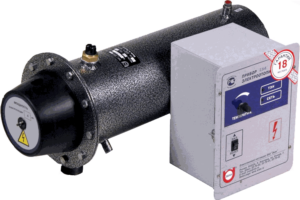
This type of heating equipment can be called the most advanced and economical. The principle of operation is used in the now popular induction cookers, when an electromagnetic field provides heating of metal parts. For this, it is not necessary to install a separate heating tank, a small heat carrier receiver is enough. A special emitter converts electrical energy into an electromagnetic pulse, due to which the water is heated.
An important nuance: it is necessary to choose models equipped with a safe shutdown system in the event of a water leak from the system. A temperature regulator is also required, which will not allow the emitter to overheat and fail.
How to choose an electric boiler for a private house
If the principle of work is more or less clear, then for a successful purchase you need to know many more nuances. First of all, this concerns the power of the boiler. For this, manufacturers give specific tips, including instructions for the heated area of the premises. For efficiency to be greater, this criterion must be "with a margin".
The purchase of an economical electric heating boiler for a home should also include a reference point for the climatic region, because the comfortable temperature in the house directly depends on the situation outside its walls. Possible heat loss can be corrected by external insulation, as well as by installing a good circulation pump.
How to calculate the boiler output? There are special formulas for this, but you can take ready-made calculations. The main value derived empirically: it is necessary to spend 40 watts of electricity to heat 1 m² of living space. The percentage of heat loss is usually used in the value of 1.5. The last required indicator takes into account the region of residence. For the southern regions, a factor of 0.7 to 1.0 is used. The middle region is characterized by a value of 1.5. To the north are climatic zones with coefficients from 1.5 to 2.0.
Electric boilers for heating a private house must take into account all these criteria. In addition, it is necessary to calculate the emergency situation in the event of a quick replacement of parts. In winter, we can talk about hours during which it is necessary to fix the breakdown. The efficiency declared by the manufacturer cannot be more than 100%, because the law of conservation of energy in this case works as clearly as possible. Optimum indicators if the electric boiler will give 95-98%, the remainder of which leaves with inevitable energy losses.
Everything you need to know about "economical" electric boilers is described in this video:
What to look for:
- Some models (with a power of more than 6 kW) must be connected to a 380 V network for operation, therefore they are not suitable for standard installation.
- It is advisable to buy safe models equipped with an automatic shutdown system under adverse conditions.
- Depending on the selected equipment, it is possible to additionally provide hot water supply (double-circuit heating elements boilers), as well as organize a modern "warm floor" system.
- The use of antifreeze liquid as a heat carrier can only be done if an induction boiler is purchased.
- The use of water of increased hardness requires preliminary filtration in order to exclude the rapid destruction of the heating elements.
Heating equipment in a private house is an important issue that requires a comprehensive approach. Fortunately, modern materials and equipment will allow you to make the most efficient and safe system. The most important element is the heating boiler. Depending on the type of heating element, power and installation method, suitable models of such equipment are distinguished. Our article will give you basic information and useful tips on choosing an electric boiler for a private house.

